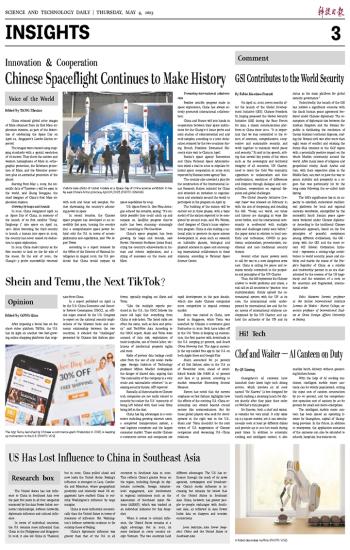
On April 21, 2022, seven months after the launch of the Global Development Initiative (GDI), Chinese President Xi Jinping proposed the Global Security Initiative (GSI) during the Boao Forum for Asia, a classic communication platform in China since 2001. "It is important that we stay committed to the vision of common, comprehensive, cooperative and sustainable security, and work together to maintain world peace and security," Xi said in his speech, adding that several key points of his vision such as the sovereignty and territorial integrity of all countries, UN Charter, need to reject the Cold War mentality, opposition to unilateralism and bloc confrontation, resolution of differences and disputes through dialogue and consultation, cooperation on regional disputes and global challenges.
The Global Security Initiative Concept Paper was released on February 21 with the aim of deepening and detailing the GSI. "Today, our world, our times and history are changing in ways like never before, and the international community is confronted with multiple risks and challenges rarely seen before," the paper states in relation to local conflicts and turbulence, COVID-19 pandemic, unilateralism, protectionism, traditional and non-traditional security threats.
Several other major powers seem to call for war in a new dangerous arms race. China is calling for peace and remains strictly committed to the purposes and principles of the UN Charter.
Thus, the GSI represents the Chinese answer to world problems and crises, a real call on all countries to "practice true multilateralism; firmly uphold the international system with the UN at its core, the international order underpinned by international law and the basic norms of international relations underpinned by the UN Charter; and uphold the authority of the UN and its status as the main platform for global security governance."
Undoubtedly, the launch of the GSI has yielded a significant outcome with the Saudi Iranian peace agreement brokered under Chinese diplomacy. The resumption of diplomatic ties between the Arabian Kingdom and the Persian Republic is facilitating the resolution of thorny bilateral territorial disputes, ending the Yemeni civil war after more than eight years of conflict and relaxing the Sunni-Shia tensions in the Gulf region with a potentially positive impact on the whole Muslim community around the world. After many years of religious and geopolitical rivalry, Saudi Arabia and Iran, with their respective allies in the Middle East, can start to pave the way to peace, stability and prosperity in a region that was particularly hit by the long crisis following the so-called Arab Spring.
The GSI's significance lies in its capacity to establish customized multilateral platforms for local and regional contexts worldwide, exemplified by the successful Saudi Iranian peace agreement brokered under Chinese diplomacy. According to the traditional Chinese diplomatic approach, based on the five principles of peaceful coexistence among different civilizations, the GSI - along with the GDI and the more recent GCI (Global Civilization Initiative) - represents a cutting-edge contribution to world security, peace and stability and marks the status of the People's Republic of China as a reliable and trustworthy partner in an era characterized by the erosion of the US hegemony and the emersion of a new, so far uncertain and fragmented, international order.
Fabio Massimo Parenti, professor at the Italian International Institute Lorenzo de 'Medici - Marist College, associate professor of International Studies at China Foreign Affairs University in Beijing


 Next
Next




